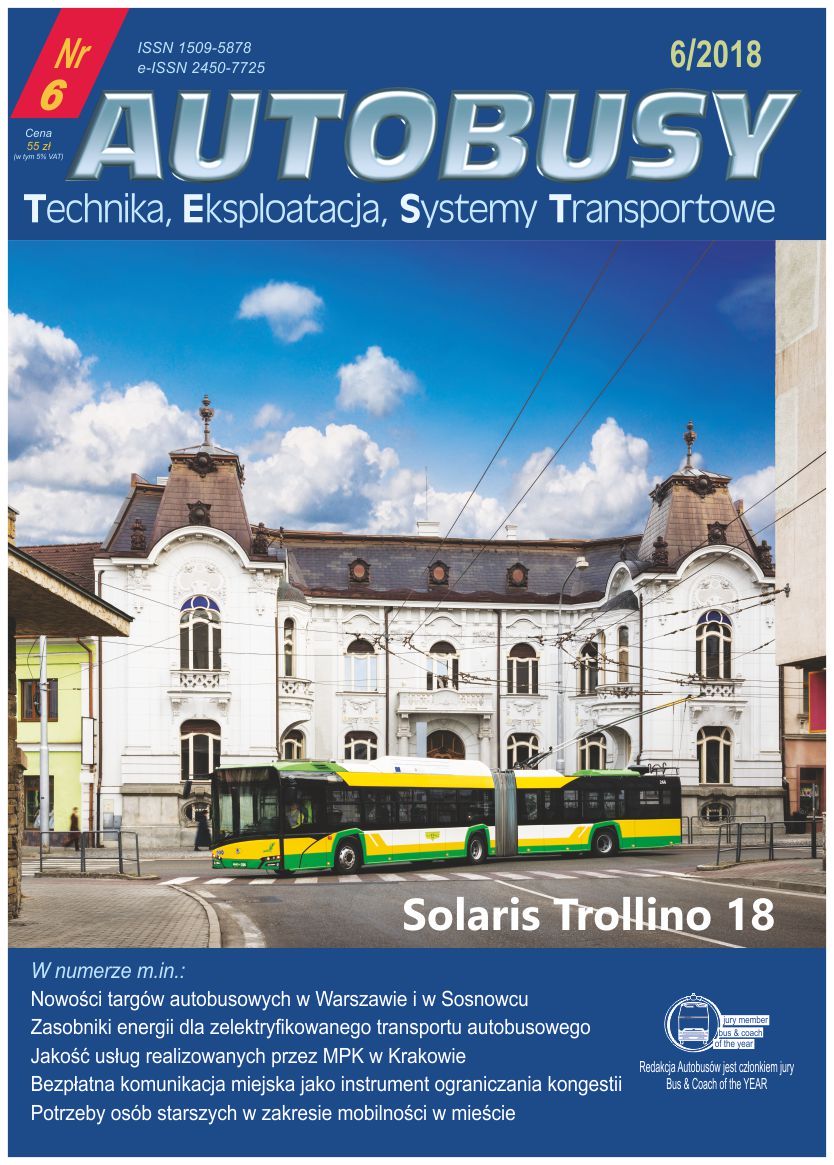Functional analysis of railway traffic control system using an expert system
DOI:
https://doi.org/10.24136/atest.2018.145Keywords:
railway transport, railway automation, expert system, transport safetyAbstract
The major functionality of railway traffic control system is to ensure efficient and safe railway traffic. Contemporary technique, electronics and informatics in particular, allows for automation of more and more tasks in transportation processes. Irrespective of the manufacturing technology, railway traffic control systems have to meet specific safety requirements. Because of this, these systems belong to group of safety-critical systems, also called safety-related systems. Due to these requirements, development, building and verification processes of railway traffic control systems always end with the assessment of correctness of each process. It should be pointed out that these processes are compound and require high skills level for persons involved in it. Because of this, an environment for an expert system (ExSys Corvid) can be used to automation of these processes. Authors used ExSys Corvid environment to build the expert system for verification and validation of Level Crossing Protection System (LCPS). Research conducted by authors confirmed high usefulness of this technology and showed the need for the usage of it in other railway traffic control systems.
Downloads
References
Alibaba, H.Z., Ozdeniz, M.B.: A building elements selection system for architects. Building and Environment, volume 39, issue 3, pp. 307-316, 2004.
Bester, L., Toruń, A.: Modeling of reliability and safety at level crossing including in polish railway conditions. Mikulski, J. (ed.) TST2014. CCIS, volume 471, pp. 38–47. Springer, Heidelberg, 2014.
Darlington, K.: The essence of expert systems. Prentice-Hall, Imprint of Pearson Education, England, 2000.
Darvasi, D., Badescu, A., Dobritoiu, C., et al.: Accounting software using expert systems. 5th WSEAS International Conference on Business Administration (ICBA 11), Puerto Morelos, Mexico, 2011. Recent Advances in Business Administration, pp. 97-102, 2011.
Dyduch J. (red.): Innowacyjne systemy sterowania ruchem. Monografia nr 147, Wydawnictwo Politechniki Radomskiej, Radom, 2010.
Exsys Inc.: Exsys Corvid Advanced Tutorial. USA, 2007.
Exsys Inc.: Exsys Corvid Knowledge Automation Expert System Development Manual. USA, 2010.
Fairuz, A.M., Sapuan, S.M., Zainudin, E.S.: Prototype expert system for material selection of polymeric-based composites for fishing boat components. Journal of Food Agriculture & Environment, volume 10, issue 3-4, pp. 1543-1549, 2012.
Giarratano J.C.: Expert systems: principles and programming (4th edition). Thomson Learning, Singapore, 2005.
Hauer, I., Butuza, A.: Competence and competitiveness with Exsys Corvid Expert System 5.2.1. 2nd Review of Management and Economic Engineering Management Conference (RMEE), Cluj Napoca, Romania, 2011. Review of Management and Economic Engineering International Management Conference, pp. 118-123, 2011.
Ionita, L., Ionita, I.: Expert-GOSP - Expert System for Three-Phase Separator Diagnosis. Studies in Informatics and Control, volume 24, issue 3, pp.293-300, 2015.
Jackson, P.: Introduction to expert systems. Addison-Wesley, England, 1999.
Kornaszewski, M., Bojarczak, P., Pniewski, R: Introduction of world innovative technologies to railway transport in Poland. Proceedings of the 16th International Scientific Conference Globalization and Its Socio-Economic Consequences, Part II, pp. 962-969, 2016.
Lewiński, A., Perzyński, T.: The Reliability and Safety of Railway Control Systems Based on New Information Technologies. Communications in Computer and information Sience (104), Springer-Verlag Berlin Heidelberg, pp. 427-433, 2010.
Łukasik, Z., Ciszewski, T., Młynczak, J., Nowakowski, W., Wojciechowski, J.: Assessment of the safety of microprocessor-based semi-automatic block signalling system. 13th Scientific and Technical Conference TST P2016, Katowice, Poland, 2016. Contemporary Challenges of Transport Systems and Traffic Engineering, Book Series: Lecture Notes in Network and Systems, volume 2, pp. 137-144, 2017.
Moise, M., Zingale, M.: Developing an Expert System for Invention Patent Examination. 20th International Danube-Adria-Association-for-Automation-and-Manufacturing Symposium, Vienna, Austria, 2009. Annals of DAAAM for 2009 & Proceedings of the 20th International DAAAM Symposium, volume 20, pp. 1447-1448, 2009.
Nowakowski W., Ciszewski T., Młyńczak J., Łukasik Z.: Failure Evaluation of the Level Crossing Protection System Based on Fault Tree Analysis. Recent Advances in Traffic Engineering for Transport Networks and Systems, Macioszek E. & Sierpiński G. (Eds.), Book Series: Lecture Notes in Network and Systems, Volume 21, pp. 107-115, Springer-Verlag Berlin Heidelberg, 2018.
Nowakowski, W., Łukasik, Z., Bojarczak, P.: Technical safety in the process of globalization. Proceedings of the 16th International Scientific Conference Globalization and Its Socio-Economic Consequences, Part IV, pp. 1571-1578, 2016.
Pniewski R., Kornaszewski M.: Global safety of Traffic Control Systems in anthropotechnical aspects. 17th International Scientific Conference Globalization and Its Socio-Economic Consequences. Proceedings, Part IV. pp. 2012-201, 2017.



